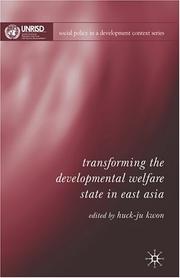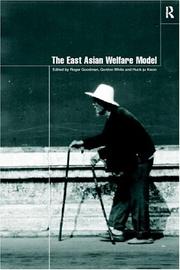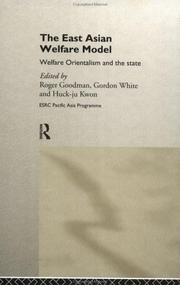| Listing 1 - 10 of 17 | << page >> |
Sort by
|
Book
ISBN: 9811646007 9811646015 Year: 2022 Publisher: Gateway East, Singapore : Palgrave Macmillan,
Abstract | Keywords | Export | Availability | Bookmark
 Loading...
Loading...Choose an application
- Reference Manager
- EndNote
- RefWorks (Direct export to RefWorks)
Digital
Year: 1999 Publisher: London Centre for Analysis of Social Exclusion, London School of Economics
Abstract | Keywords | Export | Availability | Bookmark
 Loading...
Loading...Choose an application
- Reference Manager
- EndNote
- RefWorks (Direct export to RefWorks)
Book
Year: 2005 Publisher: Geneva UNRISD
Abstract | Keywords | Export | Availability | Bookmark
 Loading...
Loading...Choose an application
- Reference Manager
- EndNote
- RefWorks (Direct export to RefWorks)
Book
ISBN: 0333699270 Year: 1999 Publisher: London Macmillan
Abstract | Keywords | Export | Availability | Bookmark
 Loading...
Loading...Choose an application
- Reference Manager
- EndNote
- RefWorks (Direct export to RefWorks)

ISBN: 1403941661 Year: 2005 Publisher: Basingstoke Palgrave Macmillan
Abstract | Keywords | Export | Availability | Bookmark
 Loading...
Loading...Choose an application
- Reference Manager
- EndNote
- RefWorks (Direct export to RefWorks)
East Asia --- Economic conditions. --- Economic policy. --- Social policy.
Book
ISBN: 3319010972 3319010980 3319033212 Year: 2014 Publisher: Cham : Springer,
Abstract | Keywords | Export | Availability | Bookmark
 Loading...
Loading...Choose an application
- Reference Manager
- EndNote
- RefWorks (Direct export to RefWorks)
In the postwar period, Korea’s economic and social-political metamorphosis is a rare example of a successful transition from one of the world’s poorest developing countries to a highly sophisticated industrial society—an experience which many developing countries are keen to emulate. The change is particularly significant as Korea was able to reduce poverty and keep social inequality at a modest level during its rapid economic development. This volume analyzes the Korean transition in regards to the political and institutional foundation of its government and public policies. The government of Korea single-mindedly carried out public policies to stimulate economic growth, but the government and public policies have themselves been affected and changed by the process. The contention of this volume is that the transition of Korean society and the evolution of the Korean government are the results of two-way interactions. In this context, the volume analyzes the way in which the dynamics of public administration were shaped within the Korean government and the kinds of public policies and instruments that were adopted to encourage this economic and social development. This analysis will allow a more complete understanding of the economic and social transformation of Korea. Surprisingly, there is a paucity of research on this aspect—a gap which this volume seeks to fill. This volume shows that it is necessary to maintain consistency and coherence in government and public policy in order to achieve economic and social transformation, making it of interest to both scholars and policy-makers concerned with development in the Asia-Pacific.
Political Science --- Law, Politics & Government --- Political Science - General --- Economic development --- Korea --- Economic conditions. --- Development, Economic --- Economic growth --- Growth, Economic --- Political science. --- Political economy. --- Development economics. --- Political Science and International Relations. --- Political Science. --- Development Economics. --- Political Economy. --- Economic policy --- Economics --- Statics and dynamics (Social sciences) --- Development economics --- Resource curse --- International Political Economy. --- Administration --- Civil government --- Commonwealth, The --- Government --- Political theory --- Political thought --- Politics --- Science, Political --- Social sciences --- State, The --- Economic theory --- Political economy --- Economic man

ISBN: 041517211X Year: 1998 Publisher: London Routledge
Abstract | Keywords | Export | Availability | Bookmark
 Loading...
Loading...Choose an application
- Reference Manager
- EndNote
- RefWorks (Direct export to RefWorks)

ISBN: 1134692900 1282777416 9786612777417 0203019164 9780203019160 9780415172103 0415172101 9780415172110 041517211X 0415172101 041517211X 9781134692903 9781134692859 1134692854 9781134692897 1134692897 9781282777415 6612777419 Year: 1998 Publisher: London New York Routledge
Abstract | Keywords | Export | Availability | Bookmark
 Loading...
Loading...Choose an application
- Reference Manager
- EndNote
- RefWorks (Direct export to RefWorks)
Offers the first broad-ranging study of the development and implementation of various welfare systems in East Asia, unfolding the reality behind the rhetoric in this important area.
Public welfare --- Human services --- Economic security --- Security, Economic --- Economic policy --- Social policy --- Welfare economics --- Services, Human --- Benevolent institutions --- Poor relief --- Public assistance --- Public charities --- Public relief --- Public welfare reform --- Relief (Aid) --- Social welfare --- Welfare (Public assistance) --- Welfare reform --- Social service --- Government policy
Book
Year: 2009 Publisher: Oxford Blackwell
Abstract | Keywords | Export | Availability | Bookmark
 Loading...
Loading...Choose an application
- Reference Manager
- EndNote
- RefWorks (Direct export to RefWorks)
Digital
ISBN: 9783319010984 Year: 2014 Publisher: Cham Springer International Publishing
Abstract | Keywords | Export | Availability | Bookmark
 Loading...
Loading...Choose an application
- Reference Manager
- EndNote
- RefWorks (Direct export to RefWorks)
In the postwar period, Korea’s economic and social-political metamorphosis is a rare example of a successful transition from one of the world’s poorest developing countries to a highly sophisticated industrial society—an experience which many developing countries are keen to emulate. The change is particularly significant as Korea was able to reduce poverty and keep social inequality at a modest level during its rapid economic development. This volume analyzes the Korean transition in regards to the political and institutional foundation of its government and public policies. The government of Korea single-mindedly carried out public policies to stimulate economic growth, but the government and public policies have themselves been affected and changed by the process. The contention of this volume is that the transition of Korean society and the evolution of the Korean government are the results of two-way interactions. In this context, the volume analyzes the way in which the dynamics of public administration were shaped within the Korean government and the kinds of public policies and instruments that were adopted to encourage this economic and social development. This analysis will allow a more complete understanding of the economic and social transformation of Korea. Surprisingly, there is a paucity of research on this aspect—a gap which this volume seeks to fill. This volume shows that it is necessary to maintain consistency and coherence in government and public policy in order to achieve economic and social transformation, making it of interest to both scholars and policy-makers concerned with development in the Asia-Pacific.
| Listing 1 - 10 of 17 | << page >> |
Sort by
|

 Search
Search Feedback
Feedback About UniCat
About UniCat  Help
Help News
News